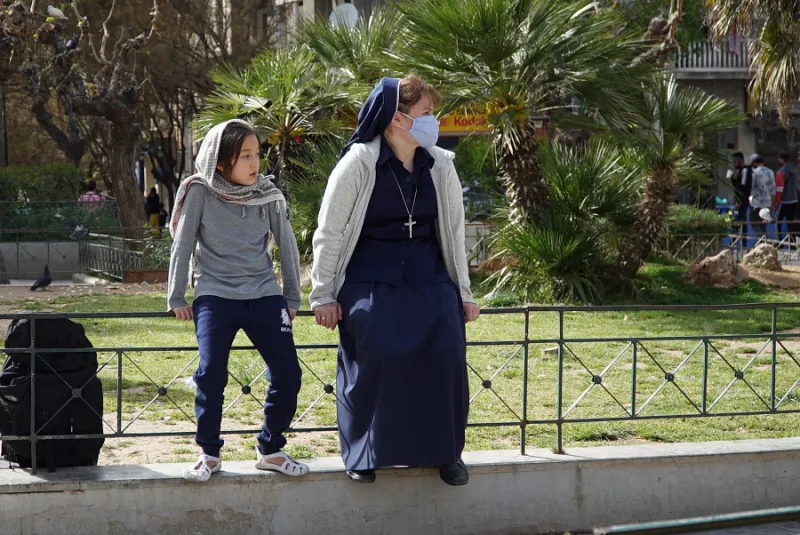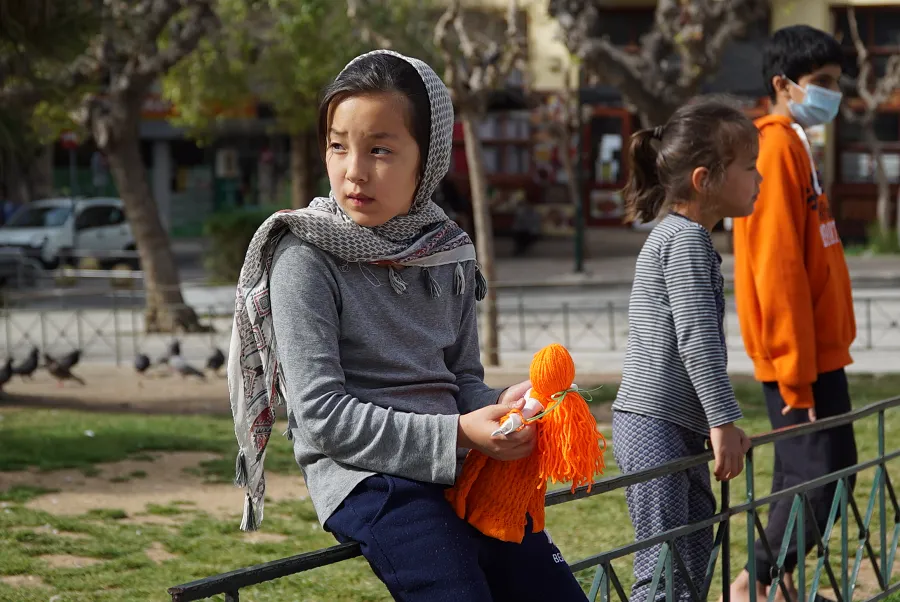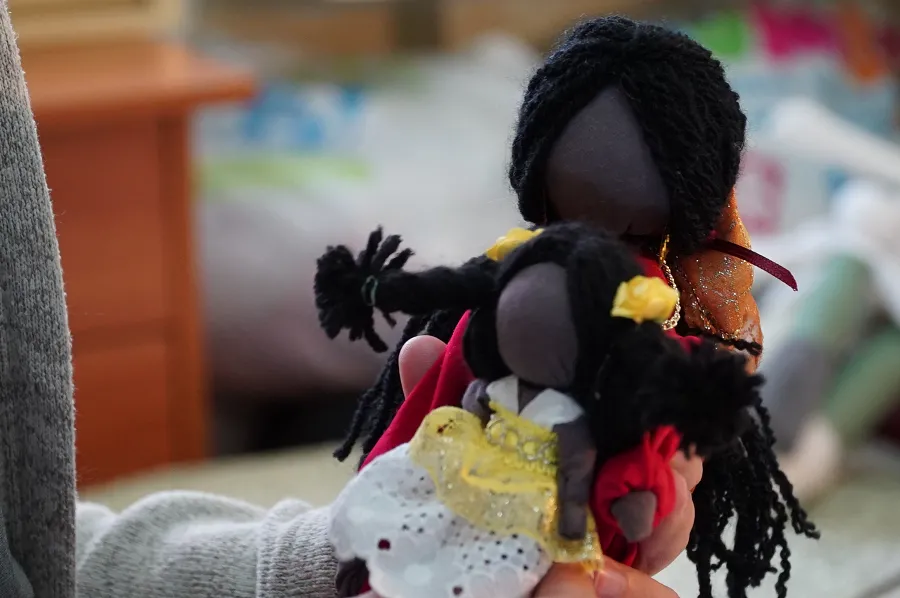
Rome Newsroom, Apr 15, 2021 / 04:00 am (CNA).
Sr. Victoria Kovalchuk wanted to be a missionary in South America, but God had other plans for the Catholic convert from Crimea, who is now helping the refugee population in Greece.
“My dream was Brazil,” she said in an interview with EWTN News in Athens. “I didn’t go to Brazil and I think now it will not be [a] big problem if I will not go there because I really fell in love with Greece.”
“And this is the best place for this time which God gave me,” she said. “This is the place where he speaks to me through the country and through the people that I am working [with] every day.”
A Holy Spirit Missionary sister, 38-year-old Kovalchuk and other members of her community serve the refugee and migrant community in Athens together with employees and volunteers of Jesuit Refugee Service (JRS).
She said she has no power to change the physical and political situation of asylum seekers in Greece, “but what I can do is love.”
“I tell them: I came here to be with you in your situation. When you cry, I will be with you. When you laugh, I will be with you. I can show you a little bit of love that I have.”
The sister said she also tries to teach people about the origin of her love, that “Jesus is the one who brought me here, who put this love inside me and [allows] me to leave my family and my country…”
During the refugee crisis of 2015 and 2016, Greece saw the arrival of over 1 million refugees.
While the number of people entering the country in 2020 was drastically lower, there were still over 15,000 new arrivals, mostly from Afghanistan, Syria, Iran, and the Democratic Republic of Congo.
According to the UN Refugee Agency, at the end of 2019, Greece was hosting over 186,000 refugees and asylum seekers, including more than 5,000 unaccompanied minors. Most of these are on the country’s eastern islands off the coast of Turkey.
In 2020, fires at camps on the Greek islands of Lesbos and Samos displaced thousands of refugees and asylum seekers, some of whom escaped to Athens, taking up refuge in Victoria Square, Sr. Kovalchuk said.

The square is often called Afghani Park now, after the Afghan refugees who live there. The sister said it is a meeting place for women and children.
“Mostly we are working with the Afghani people, who are Muslims. And of course, also, we have Christians and we have Catholics from Cameroon,” she said.
She does not call them refugees and migrants, she stated. “These are my friends and these are … the people of God, of my God who created them, who loved them and, of course, I would like them to know him.”
From Crimea to Greece
Kovalchuk was born in Crimea in the 1980s and baptized in the Eastern Orthodox Church.
Though her family did not practice the faith, she said there were always signs of God’s presence in her life.
She recalled a specific moment from her childhood, when she borrowed a children’s Bible from the library. She did not want to return it, but knowing she would have to, she started to copy out the Bible stories in a notebook.
Kovalchuk never finished writing down the stories, and, she confessed, she never returned the Bible to the library.
After the fall of the Soviet Union, Bibles again appeared on store shelves and in shops and her grandmother bought one.
“And I remember I was so impressed by this book that I used to bring it to the kitchen to open the very first page and start reading,” she recalled.
“I could not understand anything,” she continued. “I closed the book and I said, ‘one day I will read it.’ … And thanks to God, I have read it and continue to read it. But even through this experience I can see God was somehow close and was already acting in my life.”
The missionary sister discovered the Catholic Church through her love of the French language and culture. When she read French novels, she was introduced to the features and vocabulary of Catholicism.
“So I just wanted to see how the French people pray and what was the Mass and remembering one of the books, even of Alexandre Dumas, I was reading about [the] ‘Te Deum’ and I felt I want[ed] to know what is this ‘Te Deum?’”
Polish girls at her university brought her to their Catholic chapel, where she attended her first Mass on July 8, 2001.
She said she wanted to stay forever. But knowing she had been baptized Orthodox, she at first had doubts about whether it was right to join the Catholic Church.
Kovalchuk came to realize converting was not so much a change — she still believed in the same God — as a discovery of something, a deepening of God’s presence in her life through the sacraments.
Soon after becoming Catholic at the age of 18, she began to feel a desire to enter religious life, which she did after finishing university. Before Kovalchuk’s superior asked her to come to Greece, she was serving in Ukraine.
English lessons and rag dolls
When refugees fled the Moria camp on Lesbos after the fires last year, some of them were living for days or weeks in Victoria Square, Kovalchuk said.
She and other volunteers would go there every day to play with the children and to tell the women about the center they run which has showers and a place to wash clothes.
The center also has a shop with free second-hand clothing and a social worker who answers questions and shares other resources for refugees and migrants.
The volunteers and sisters give language lessons in Greek, French, and English. During the COVID-19 pandemic the lessons have been done via video call.
They also offer activities and classes for children, many of whom are not in school, and otherwise do not have things to occupy them.
Sr. Kovalchuk also took up a Ukrainian tradition: making rag dolls called motanka.
“Our refugee kids do not have any toys and nothing to play with. This is actually the best place for my dolls,” she said, estimating that she has made and given out around 500.
The sister recycles leftover donated clothes, those in too poor a condition to be worn, to make her dolls.
She said the kids like to sit with her and watch her make the dolls, or even learn to make them alongside her.

“They choose different color of the dress, of hair. And I think this is also very important and a little bit, like, therapeutic,” she said, because the children do not have opportunities to make choices in their day-to-day life, even about small things like what they want to wear.
She said, “So for them, it brings a lot of joy even if they can choose their own way, their own style.”
“And when I see the smiles, the happiness of these children who actually have nothing,” she said, “who sometimes are hungry, who cannot come to the shop and can ask, ‘mommy, buy me this doll or mommy, buy me this car. Or give me this or give me that,’ but they are happy with the simple stuff.”
Despite differences in language, culture, and religion, Kovalchuk said she feels respected and appreciated by those she helps
Families she visits will set a table and bake bread or make tea to serve her.
The children, unprompted, will bring her water when the weather is hot, or share their cookies with her. When sitting on the ground, they will bring her a paper bag to sit on.
“And this is very touching and this helps me to see how God takes care of me also through them, although they are different nationalities and different religions,” she described.
“But these kids, they are just satisfied and then they will hug me and then they will kiss me. And this is the best [thing that] I can get as a reward, these signs of love as a response.”
“My journey here started maybe first of all from my need, my personal need to meet and rediscover God again in my life and in my vocation,” the sister said. “And those people they helped me here. So this is mutual: I try to help them in the way that I can, just being with them and then, they help me a lot.”
If you value the news and views Catholic World Report provides, please consider donating to support our efforts. Your contribution will help us continue to make CWR available to all readers worldwide for free, without a subscription. Thank you for your generosity!
Click here for more information on donating to CWR. Click here to sign up for our newsletter.




Leave a Reply